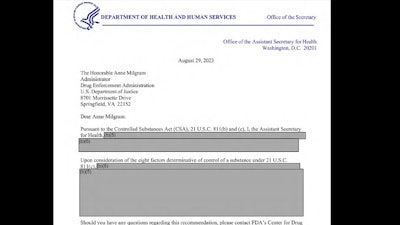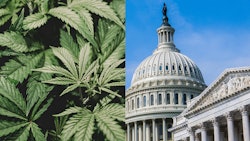
UPDATE: On Jan. 12, the day after this article posted, the U.S. Department of Health and Human Services released an unredacted version of its rescheduling recommendation:
Cannabis Rescheduling Document Details Rationale For Schedule III Recommendation
RELATED: 7 Takeaways From the Feds' Cannabis Rescheduling Recommendation
Soon, the widely reported and heavily redacted August letter detailing the U.S. Department of Health and Human Services’ (HHS) cannabis rescheduling recommendation will be released after months of speculation and waiting.
The U.S. Department of Justice (DOJ) confirmed Jan. 11 that HHS will release “the letter and its enclosures in their entirety” in response to a Freedom of Information Act (FOIA) lawsuit and motion for summary judgment filed by Matthew Zorn, partner at Yetter Coleman.
Zorn wrote, “I win” in the newsletter sent Jan. 11, which he co-produces with fellow attorney and cannabis advocate Shane Pennington, partner at Porter Wright Morris & Arthur.
“This is nothing to me. Impossible just takes a few weeks. I do this in my sleep,” Zorn wrote. “This could mean, by the way, that a rescheduling is imminent—or not,” adding a footnote that “A Federal Register notice announcing rescheduling would attach the letter and its enclosures.”
HHS confirmed in an email Aug. 30 to CBT that it “expeditiously responded to President Biden’s directive to HHS Secretary [Xavier] Becerra and provided its scheduling recommendation for marijuana to the DEA [Drug Enforcement Administration] on August 29, 2023.”
But after email correspondence between CBT, HHS and DEA, as well as FOIA requests to both the HHS and DEA from CBT and others, neither agency confirmed if HHS recommended reclassifying cannabis from a Schedule I to a Schedule III substance in the Controlled Substances Act (CSA), as Bloomberg first reported after seeing but not obtaining the letter. No other media outlets have reported seeing nor obtaining a copy of the HHS letter to the DEA.
The DEA has final authority over rescheduling, which an agency official emphasized in a December letter to U.S. Rep. Earl Blumenauer, D-Ore., as previously reported by CBT.
“On Aug. 29, 2023, DEA received a letter from the Department of Health and Human Services (HHS) providing its findings and recommendation on marijuana scheduling, pursuant to President Biden’s request for an administrative review,” Michael Miller, acting chief of the DEA’s Office of Congressional Affairs, wrote in the Dec. 19 letter to Blumenauer. “As part of this process, HHS first conducts a scientific and medical evaluation, and then DEA conducts its own review. DEA has the final authority to schedule, reschedule or deschedule a drug under the Controlled Substances Act, after considering the relevant statutory and regulatory criteria and HHS’s scientific and medical evaluation. DEA is now conducting its review.”
Zorn filed the lawsuit to obtain the HHS letter Sept. 29 in the U.S. District Court in the District of Columbia, after HHS: failed to produce the letter in response to Zorn’s FOIA request (filed Aug. 30); has not made “a timely determination within 20 days” regarding the request; and has not made “a timely determination on expedited treatment” requested by Zorn in his FOIA request, according to the suit and as detailed in previous reporting from CBT.
On Nov. 14, Zorn filed a motion for summary judgment, which if the court had decided the HHS exemption claims to the FOIA request applies, it would have had to explain why it applies. (In other words, HHS would have had to explain why the documents had to be redacted.)
“I just want the document to be posted,” Zorn told CBT in November. “That’s it. I do not care about making any broader point of law. I just want the document.”
The default deadline for a response was Nov. 24, but the DOJ requested an extension to Dec. 12, according to an email exchange Zorn shared with CBT.
“What’s unique about this case, is … not only are lots of folks in the media talking about it and the recommendation, but literally lawmakers are writing letters, like Senator [Kirsten] Gillibrand … and nobody's ever seen [the letter], right?” Zorn said about a letter Gillibrand wrote to the DEA urging the agency to move cannabis to Schedule III and another letter sent by a group of 31 U.S. House members. “What's even more inexplicable is assuming they do go forward with rescheduling, they're going to have to release the document anyway. So really this isn't about them protecting a process at all. It's just them playing politics.”
And since November, others have called on the DEA to reschedule cannabis—and soon—including U.S. Rep. Steve Cohen, D-Tenn., who wrote a letter Jan. 4 to DEA Administrator Anne Milgram urging her “in the strongest possible way” to act expeditiously on the HHS recommendation, as noted in previous CBT reporting.
However, according to Pennington, “Where we are in the process is still very early,” he told CBT earlier this month. “DEA has HHS’ recommendation, which is an important step, but it’s very preliminary because now we’re going to get, eventually, a proposed rule from DEA, then we’ll get notice and comment for 60 days, [a] public participation period. And at the same time, DEA will allow interested parties to request hearings on the record.”
Then, once the DEA writes the final rule, there is supposed to be another waiting period before implementation, according to Pennington.
“There are some exceptions to that, but the DEA generally requires a 30-day delay between the time it’s published and the time it becomes effective,” he said “And so, for those who are really wanting to know, can this get done by the election, which I think is a question that many people are asking, my view is because of everything I just said, probably not. Because no matter how much the president or [DEA Administrator] Anne Milgram wanted to get done that fast, those processes take time.”
























